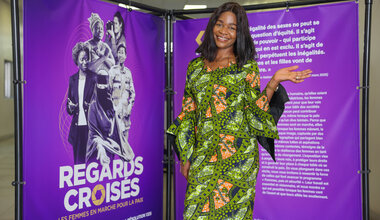Ban Ki-moon encouraged by the arrest of “Lieutenant-colonel” Mayele
New York/Kinshasa, 6 October 2010 – UN Secretary-General held his regular monthly press conference at the UN headquarters during which he touched on the "mapping report" concerning the Democratic Republic of Congo (DRC). Concurrently, his Special Representative for sexual violence in conflict, Margot Wallstrom was winding up her eight-day mission to the DRC, where she visited the East of the country to monitor the situation.
Ban Ki-moon forthwith rejected the allegations that the "mapping report" on the gross human rights violations committed in DRC between 1993 and 2003 was toned down as some said, "to save face for any troop-contributing nations."
Highlighting the independence of the High Commissioner for Human Rights who issued the report, the Secretary-General also underscored that those who committed these crimes as well as their leaders must be arrested and indicted for crimes against humanity by National or International tribunals.
This is a very good example of cooperation between Congolese authorities and MONUSCO
On the eve, the United Nations Mission in the Democratic Republic of Congo (MONUSCO) had announced the arrest of "Lieutenant-colonel" Mayele of the Maï Maï group Cheka in the Walikale region, as part of the joint activities conducted by MONUSCO North Kivu Brigade and the Government of the DRC. "Lieutenant-colonel" Mayele is suspected as one of the masterminds behind the mass rapes and other human rights violations committed in the North Kivu between 30 July and 2 August 2010.
These acts were allegedly committed by a coalition of about 200 elements from the Maï Maï Cheka, the Democratic Forces for the Liberation of Rwanda (FDLR), as well as the elements of Colonel Emmanuel Nsengiyumva, former FARDC and ex-CNDP on at least 303 civilians including 235 women, 13 men, 52 girls and 3 boys, according to the preliminary report of the investigative mission of the United Nations Joint Human Rights Office (UNJHRO).
Ban Ki-moon said he was "encouraged" by the arrest of Mayele which he referred to as a good example of cooperation between the Congolese authorities and MONUSCO.
In regard to the Mission's activities, the Secretary-general was 'realistic': the country is too large, the number of peacekeepers too small and the resources too limited. In this regard, MONUSCO is reinforcing its alert system for civilian protection.
"Sexual violence is one of the major obstacles to peace in the DRC. Unchecked, it could disrupt the entire social fabric in the country," said the UN Secretary-General, echoing his Special Envoy, Margot Wallstrom.
Margot Wallstrom's Mission to the DRC
Ms. Wallstrom, Special Representative on sexual violence in conflict arrived at Kinshasa on 28 September and visited eastern DRC: Bunia, Bukavu, Goma, Walikale and Kitchanga to review the situation on sexual violence in these regions.
Before returning to New York, Ms. Wallstrom held a press conference at MONUSCO headquarters in Kinshasa, where she also welcomed the arrest of "Lieutenant-colonel" Mayele as "a good news for the Congolese people" and "a strong signal that sexual violence is not acceptable". "End to impunity has started", she concluded.
Related Links:
- UN releases D.R. Congo report listing 10 years of atrocities, identifying justice options
- UN High Level panel to hear from victims of sexual violence in the DRC
- UN Special Representative on sexual violence is paying a working visit to the DRC
- The UN releases preliminary findings of the inquiry into massive rapes in Walikale territory
 UN
UN United Nations Peacekeeping
United Nations Peacekeeping






